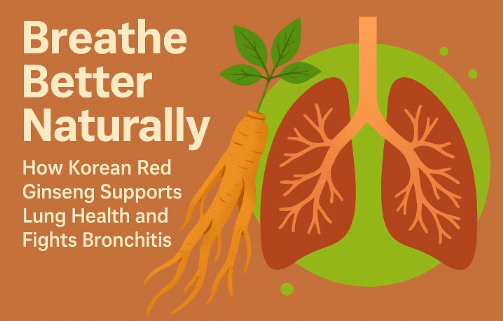Introduction: The Forgotten Power of Lung Health
Every breath we take fuels our body with life, yet our lungs are constantly exposed to pollution, pathogens, and inflammation. Chronic respiratory conditions — like bronchitis, pneumonia, and asthma — affect millions globally, causing fatigue, shortness of breath, and weakened immunity.
In traditional Korean medicine, Korean Red Ginseng (Panax ginseng Meyer) has long been revered as a lung tonic, believed to strengthen respiratory Qi and restore vitality. Modern science now validates this — showing that ginseng helps reduce airway inflammation, strengthen immune defenses, and enhance oxygen utilization.
1. Korean Red Ginseng and the Respiratory System
Korean Red Ginseng (KRG) works as a natural adaptogen and immunomodulator, helping the body resist respiratory stress and inflammation.
Research shows it benefits lung health through these mechanisms:
- Reduces airway inflammation and mucus overproduction
- Enhances immune defense against respiratory pathogens
- Improves oxygen uptake and lung function
- Supports recovery from bronchitis and pneumonia
A review published in Frontiers in Pharmacology (2022) confirmed that ginsenosides — the main active compounds in KRG — have anti-inflammatory and antiviral effects that help protect lung tissue from oxidative damage.
[Source]
2. Anti-Inflammatory Action for Bronchitis Relief
Bronchitis is often caused by infection or exposure to irritants like smoke and pollution, leading to inflamed airways and excessive mucus.
Korean Red Ginseng’s anti-inflammatory and antioxidant properties help calm this response.
Key ginsenosides (such as Rb1 and Rg3) suppress inflammatory cytokines like TNF-α and IL-1β, which drive airway swelling. A 2021 study in the Journal of Ginseng Research found that KRG reduced lung inflammation and improved airway clearance in animal models of bronchitis and asthma.
[Source]
Results included:
- Easier breathing
- Reduced coughing
- Decreased mucus buildup
- Faster lung tissue recovery
This makes KRG a potential natural adjunct therapy for chronic bronchitis, especially in older adults or smokers.
3. Strengthening Immunity Against Lung Infections
Pneumonia and chronic bronchitis often occur when immune defenses weaken.
Korean Red Ginseng enhances both innate and adaptive immunity, helping the lungs resist viral and bacterial infections.
Clinical research from Nutrients (2020) demonstrated that people taking red ginseng supplements experienced fewer respiratory infections and faster recovery from viral illnesses like influenza.
[Source]
Mechanisms include:
- Stimulating macrophage activity (cellular defense)
- Increasing antibody production
- Enhancing mucosal immunity in the respiratory tract
This immune modulation supports recovery and prevents relapses of chronic respiratory inflammation.
4. Supporting Oxygen Uptake and Endurance
Beyond treating infections, Korean Red Ginseng helps improve oxygen utilization — a vital factor in lung performance.
Athletes and elderly individuals alike benefit from KRG’s ability to:
- Enhance oxygen exchange in alveoli (air sacs)
- Improve endurance and reduce fatigue
- Support energy metabolism during low oxygen conditions
A study published in Phytotherapy Research (2018) found that 8 weeks of KRG supplementation improved VO₂ max (maximum oxygen uptake) and lung capacity in healthy adults, confirming its role as a natural respiratory enhancer.
5. Protection Against Pollution and Oxidative Stress
Air pollution, cigarette smoke, and environmental toxins generate free radicals that damage lung cells.
Korean Red Ginseng acts as a powerful antioxidant, neutralizing these harmful molecules and protecting pulmonary tissue.
Its ginsenosides activate Nrf2, the body’s key antioxidant regulator, helping cells detoxify and repair themselves.
This makes KRG especially valuable for people living in urban areas with high air pollution or exposure to irritants.
6. Korean Red Ginseng and Pneumonia Recovery
For patients recovering from pneumonia, ginseng may support lung regeneration and immune stability.
Clinical data indicate that KRG:
- Accelerates recovery by reducing inflammation
- Prevents post-infection fatigue
- Enhances response to vaccinations
In fact, studies show that older adults who take KRG regularly respond better to influenza and pneumonia vaccines, demonstrating enhanced immunologic memory.
[Source]
7. How to Take Korean Red Ginseng for Lung Health
Recommended dosage:
- 500–1000 mg/day of standardized extract (3–5% ginsenosides)
- Duration: 8–12 weeks for measurable benefits
- Best taken: Morning, before or after meals
Available forms:
- Extract capsules and powders
- Liquid tonics or teas
- Ginseng honey slices or roots
Combination tip:
For synergistic results, combine with Cordyceps sinensis or Astragalus membranaceus, both known for their respiratory and immune benefits.
8. Safety and Precautions
Korean Red Ginseng is safe for long-term use when taken as directed.
However:
- Consult a physician if taking immunosuppressants or corticosteroids
- Avoid high doses if you have severe insomnia or active infection fever
- Ensure product authenticity — choose certified Korean Red Ginseng only
Conclusion: Breathing Life with Korean Red Ginseng
Lung health is essential to longevity — and Korean Red Ginseng offers holistic protection that modern medicine is only beginning to understand.
From reducing airway inflammation and enhancing oxygen flow to boosting immunity, this traditional Korean remedy delivers modern respiratory support for the polluted, stressful world we live in.
With each breath, your lungs carry life. Let Korean Red Ginseng help you make every breath stronger.
🇰🇷 Premium Korean Ginseng Online Shop







